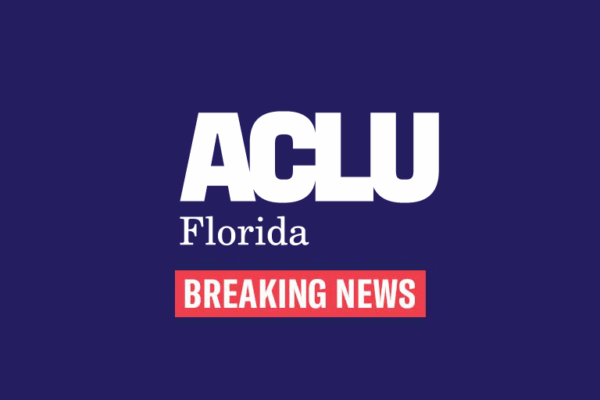TALLAHASSEE, FL – Southern Legal Counsel, the ACLU of Florida, and pro bono attorney Eric Lindstrom today filed a federal lawsuit against the Florida Department of Management Services, the University of Florida, and the Public Defender of the Second Judicial Circuit of Florida on behalf of named plaintiffs Jami Claire and Kathryn Lane, who as state employees were denied medically necessary treatment for gender dysphoria because of the state’s categorical exclusion of coverage for “gender reassignment or modification services or supplies.”
Some transgender people experience gender dysphoria, the medical diagnosis for the clinically significant distress sometimes resulting from incongruence between a person’s gender identity and their sex assigned at birth. Left untreated, this serious medical condition often leads to debilitating distress, depression, anxiety, impairment of function, and self-harm, including suicide.
“We brought this lawsuit because all people need access to medical care. This is not about special treatment; this is about equal treatment,” said lead counsel Simone Chriss of Southern Legal Counsel. “Transgender state employees are singled out and explicitly denied coverage for one reason: they are transgender. That is discrimination, and it cannot stand.”
The suit alleges the State’s exclusion of medically necessary gender-affirming care in all its employee health plans constitutes unlawful sex discrimination in violation of Title VII of the Civil Rights Act and the Equal Protection Clause of the Fourteenth Amendment to the U.S. Constitution. The Florida Department of Management Services establishes the terms, conditions, and criteria in the plans and intentionally procured health insurance plans with categorical exclusions for medically necessary gender-affirming care.
Medical experts overwhelmingly agree treatments for gender dysphoria, including surgical procedures, are effective, safe, and medically necessary for many transgender patients to alleviate their gender dysphoria. Indeed, leading medical organizations, including the American Medical Association and American Psychiatric Association, recognize gender-affirming care is medically necessary, and it is routinely covered by private insurance programs and the majority of Fortune 500 companies, as well as the Medicaid plans of more than 20 states.
Claire and Lane are transgender women and state employees who, because of the state’s discriminatory exclusion, were denied coverage for treatment deemed necessary by their doctors. Lane is an attorney in the Public Defender’s Office, while Claire is a senior biological scientist who has worked at the University of Florida for 32 years.
Claire has paid out-of-pocket for treatment that her state insurance should have covered. She would have spent much more if she were not a United States veteran with access to limited gender-affirming care through the Department of Veterans Affairs. Claire also requires surgery to adequately treat her gender dysphoria, but the state precludes coverage for the medical treatment she needs and deserves. Although the University of Florida does cover gender-affirming care through its self-managed “GatorCare” plans, Claire does not fall under the limited classifications of employees to whom these plans are offered.
“I am pursuing this litigation not only on my own behalf but for the sake of others who have been wrongfully denied treatment,” Claire said. “While I have had access to some gender-affirming care at the VA, many transgender state employees and employee dependents have no access to this coverage whatsoever. It’s unconscionable that someone with gender dysphoria would be denied treatment in total disregard of a doctor’s determination of medical necessity, when the same procedures are routinely covered for cisgender individuals.”
Co-counsel Jimmy Midyette of the ACLU of Florida said while the suit includes just two named plaintiffs, its outcome will affect hundreds.
“Based on the number of state employees and the percentage of Florida’s population estimated to be transgender, we can anticipate that upwards of 650 employees could be affected, and that doesn’t even take into account the state employees with transgender dependents,” Midyette said. “It’s time for this categorical discrimination to be brought to an end.”
Chriss said the lawsuit is part of a “tidal wave” of cases across the country establishing transgender exclusions in health insurance plans are arbitrary, discriminatory and unlawful.
“If Florida won’t voluntarily join the right side of history, we will gladly facilitate that journey,” she said.
The full complaint is available here: https://www.aclufl.org/app/uploads/drupal/sites/default/files/claire_v_florida_complaint.pdf
Stay Informed
Sign up to be the first to hear about how to take action.
By completing this form, I agree to receive occasional emails per the terms of the ACLU’s privacy statement.
By completing this form, I agree to receive occasional emails per the terms of the ACLU’s privacy statement.

